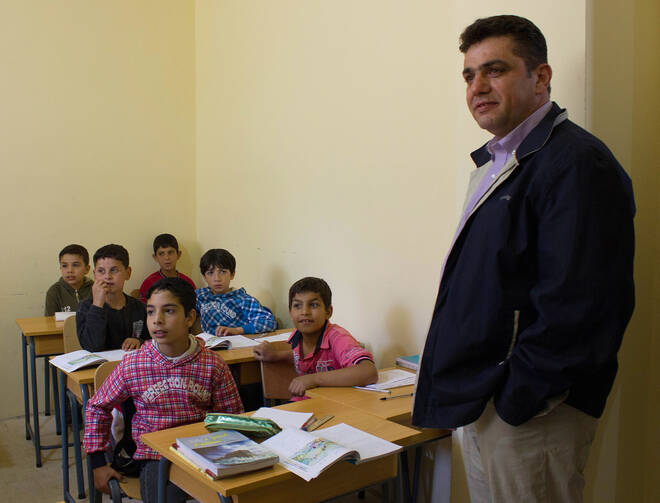In a new report, researchers from the Jesuit Refugee Service (JRS) conclude that education is a life-saving intervention for children and adolescents who are forcibly displaced from their homes. "Education is more than just a right and a response to an immediate need," the report argues. "Education also engenders hope as it prepares refugees to meet future challenges. Education provides stability and a sense of normalcy, and acts as a form of vital psychosocial support to children whose lives have been affected by crisis." An education can lessen a displaced child’s vulnerability to child labor, sexual violence, recruitment into armed groups or early marriage.
According to the report, “Providing Hope, Investing in the Future: Education in Emergencies & Protracted Crises," education plays a critical role in preparing individuals and their communities to recover and rebuild after conflict or disaster. "Education is an important tool to promote and ensure greater peace and rehabilitation following an emergency situation. With access to a quality education, individuals can better fulfill their own potential and fully contribute to the growth, strength and stability of their society. "
"This report highlights the need to prioritize education for refugees and those displaced by conflict and crisis and ensure that these important programs receive the resources and political support they deserve," said Giulia McPherson, JRS/USA's Assistant Policy Director and author of “Providing Hope.”
According to "Providing Hope," the average length of displacement for a refugee is now 17 years. In the report McPherson argues it "is impractical to consider emergency assistance and long-term development as separate endeavors" but that "the longevity of these problems require us to creatively approach new partnerships and new models of funding." She writes that today's protracted conflicts are changing the long-term options for those who are displaced. "They must be given the opportunity to forge a future for themselves and their families."
Today, more than 75 million children and young people have their education disrupted or destroyed by emergencies and prolonged crises. Attacks on schools, wars, natural disasters and the largest refugee crisis since World War II have increased the need for education in emergencies.
Despite this need, less than two percent of all humanitarian funding has gone to education every year since 2010, according to the report. JRS officials hope that during the World Humanitarian Summit, convening in Istanbul this week to tackle the most significant challenges facing the global humanitarian sector, those funding levels can be re-evaluated.
During the Summit, the Education Cannot Wait Fund will be launched. This effort aims to both mobilize and coordinate support for programs that meet the educational needs of children and youth affected by crisis.
"If we do not act [the affected youth] will become victims of child labor, child trafficking and child marriage and they will be a discontented generation of young people, a lost generation," former British Prime Minster Gordon Brown said while previewing the fund.
"We see the hope that education provides in times of great despair, when the people we serve think the world has forgotten them," said Jesuit Refugee Service West Africa Regional Director Eric Goeh-Akue, S.J.
From its founding in 1980, JRS has placed an emphasis on ensuring that the most vulnerable have access to an education, regardless of their circumstances. Working both in newer emergencies, like Syria, and in protracted displacement settings including Chad, Ethiopia and Kenya, JRS is poised to offer substantive, thoughtful insight on providing effective, quality education programs for the forcibly displaced.
"JRS education programs help ensure that the most vulnerable and disenfranchised—with a special focus on women and girls—have access to an education," said Armando Borja, Regional Director of Jesuit Refugee Service North America. In emergencies where many agencies provide basic humanitarian assistance, JRS is on the ground organizing educational and recreational activities to heal trauma, promote human dignity and build skills.








